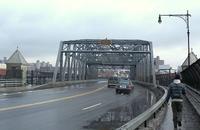-
Hurricanes will test Florida buildings, built under new, post-Wilma building codes
In 2005 Hurricane Wilma was responsible for five deaths and millions of dollars worth of damage in Florida; building codes in the state were updated, and experts predict that these new buildings, most of which were designed with wind-tunnel testing, should perform well in all but the most severe conditions
-
-
Thawing permafrost to release nitrogen, carbon – doubling the amount of carbon in the atmosphere today
As much as forty-four billion tons of nitrogen and 850 billion tons of carbon stored in arctic permafrost, or frozen ground, could be released into the environment as the region begins to thaw over the next century as a result of a warmer planet; for context, this is roughly the amount of carbon stored in the atmosphere today
-
-
Asteroid DA14 will be whizzing by Earth on 15 February -- the closest asteroid fly by in history
On 15 February 2013, asteroid 2012 DA14, the size of a city block, will be whizzing within 14,000 miles of Earth, squeezing between Earth’s atmosphere and the geostationary satellites orbiting the planet; it will be the closest asteroid fly by in history; experts say there is no chance the asteroid will hit Earth — this time; with more than 4,700 asteroids NASA has identified as potential threats to Earth, however, some as big as sixteen football fields, these objects are getting a lot of attention
-
-
Paintballs may deflect an incoming asteroid
With twenty years’ notice, paint pellets could cause an asteroid to veer off course; researchers say that, if timed just right, pellets full of paint powder, launched in two rounds from a spacecraft at relatively close distance, would cover the front and back of an asteroid, more than doubling its reflectivity, or albedo; the initial force from the pellets would bump an asteroid off course; over time, the sun’s photons would deflect the asteroid even more
-
-
Safety glass – cut to any shape
If an object slams into the glass façade of a high-rise building, the glass must not shatter and fall down, because it could harm pedestrians below; in addition, the window panes must hold if a person were to fall against it from the inside; architects and builders must therefore use something stronger than laminated safety glass on the façades of high rise buildings; scientists develop a method which offers more flexibility with the design and handling of safety glass
-
-
Scientists improving process to recycle rare-earth materials
Recycling keeps paper, plastics, and even jeans out of landfills. Could recycling rare-earth magnets do the same? Perhaps, if the recycling process can be improved; scientists are working more effectively to remove the neodymium, a rare earth element, from the mix of other materials in a magnet; initial results show recycled materials maintain the properties that make rare-earth magnets useful
-
-
Kaspersky Lab working on a secure operating system for critical infrastructure
Antivirus firmKaspersky Lab is set to make a major contribution to the security of critical infrastructure systems by developing an operating system specifically designed for such systems; the new operating system will protect information used in infrastructure such as nuclear power plants, transportation control facilities, gas and electrical systems,and other facilities “criticallyimportant” to the economy and well-being of industrialized societies
-
-
Assessing bridge resilience
Across the United States, more than 600,000 bridges link travelers to millions of roadway miles, forming a critical part of the nation’s infrastructure; because bridges are typically more vulnerable than roadways to damage caused by natural and man-made hazards, they are also of interest to DHS, which funds cutting-edge research in various aspects of structural integrity testing and blast-resistant structural design
-
-
Analyzing the sound of rain falling on a bridge reveals bridge’s health, stability

Engineers have found that by listening to how a highway bridge sings in the rain, they can determine serious flaws in the structure; employing a method called impact-echo testing, engineers can diagnose the health of a bridge’s deck based on the acoustic footprint produced by a little bit of water
-
-
Cybersecurity bill supporters want a vote on bill in this Congress
Last week, lawmakers and top White House officials appeared in different events, conferences, and industry gatherings to promote the cyber security bill which has been stalled in the Senate since August; administration’s officials and lawmakers supporting the bill warned that the current situation leaves U.S. critical infrastructure and businesses vulnerable to attack from hackers and spies
-
-
A Mississippi river diversion helped build Louisiana wetlands
The extensive system of levees along the Mississippi River has done much to prevent devastating floods in riverside communities; the levees, however, have also contributed to the loss of Louisiana’s wetlands; by holding in floodwaters, they prevent sediment from flowing into the watershed and rebuilding marshes, which are compacting under their own weight and losing ground to sea-level rise
-
-
Corps: absolute flood protection along the Missouri River is impossible
A U.S. Army Corps of Engineers report said that absolute flood protection along the Missouri River is impossible, so the basin needs to prepare and plan for flooding in the future
-
-
Sen. Rockefeller asks Fortune 500 CEOs for cybersecurity best practices

Last month, Senator Jay Rockefeller (D-West Virginia) sent a letter to the CEOs of fortune 500 companies asking them what cybersecurity practices they have adopted, how these practices were adopted, who developed them, and when they were developed; many saw Rockefeller’s letter as an admission that the Obama administration does not have a basis for trying to impose cybersecurity practices on the private sector through the Cybersecurity Act of 2012, now stalled in Congress
-
-
More companies adopt cloud disaster recovery solutions

More and more companies adopt a cloud disaster recovery solution; in a recent 2012 TechTarget Cloud Pulse survey, a majority of the 926 companies that responded have said they are now using a cloud disaster recovery system or plan to in the next six months
-
-
Scientists say it is too late to stop global warming: better to focus on adaptation, mitigation
Two scientists argue that governments and institutions should focus on developing adaption policies to address and mitigate against the negative impact of global warming, rather than putting the emphasis on carbon trading and capping greenhouse-gas emissions; they say that attempts to limit greenhouse-gas emissions through carbon cap-and-trade schemes and to promote renewable and sustainable energy sources are probably too late to arrest the inevitable trend of global warming
-
More headlines
The long view
Helping Strengthen America’s Critical Infrastructure
Everyday life depends on a robust infrastructure network that provides access to running water, communications technology and electricity, among other basic necessities. The experts who keep our national infrastructure secure and resilient also need a strong network to share their knowledge and train the next generation of professionals capable of solving complex infrastructure challenges.
AI and the Future of the U.S. Electric Grid
Despite its age, the U.S. electric grid remains one of the great workhorses of modern life. Whether it can maintain that performance over the next few years may determine how well the U.S. competes in an AI-driven world.
